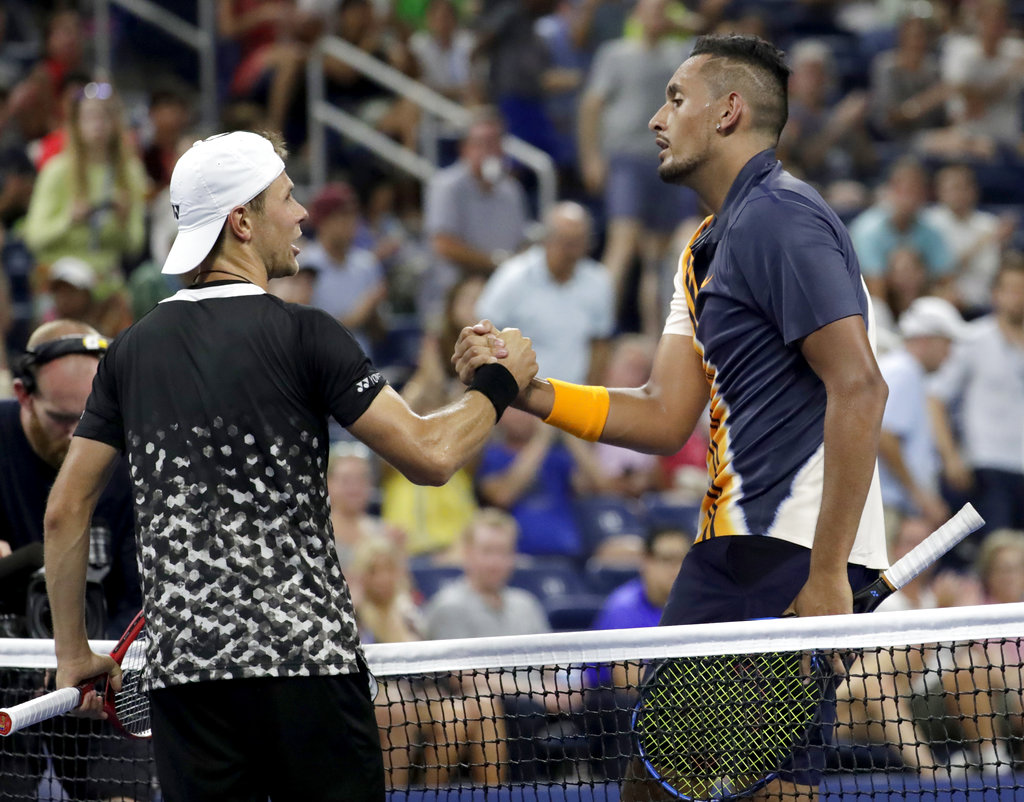‘I want to help you’: Umpire’s chat with Kyrgios at US Open raises questions

Nick Kyrgios, right, of Australia, shakes hands with Radu Albot, of Moldova, after Kyrgios won their first round match at the U.S. Open tennis tournament, Tuesday, Aug. 28, 2018, in New York. (AP Photo/Julio Cortez)
NEW YORK — Nick Kyrgios was losing big at the U.S. Open on Thursday, and barely even trying. Didn’t move while so-so serves flew by for aces. Casually put groundstrokes into the net. Double-faulted without caring.
The crowd began booing. The chair umpire, Mohamed Lahyani, decided to intervene. In an unusual sight for Grand Slam tennis, Lahyani clambered down out of his seat during a break between games, stood with hands on knees, and spoke with the 30th-seeded Kyrgios, saying, among other things, “I want to help you.”
It all seemed like an impromptu intervention for the mercurial Kyrgios, right out there on Court 17 at Flushing Meadows, and it raised questions about whether Lahyani overstepped his duties as someone who’s primarily there to keep score and keep order. Kyrgios went from trailing by a set and a break at the time to wresting control of the match — setting up a third-round showdown against Roger Federer — by coming back to beat Pierre-Hugues Herbert 4-6, 7-6 (6), 6-3, 6-0.
“This was not his job,” Herbert said, adding that he thinks Lahyani should be sanctioned in some way. “I don’t think he’s a coach, he’s an umpire, and he should stay on his chair for that.”
The U.S. Open’s referee and chief umpire were reviewing what happened, as was the Grand Slam Board. Chair umpires are never made available to the media, but tournament referee Brian Earley said Lahyani explained that he left his perch “to make sure he could communicate effectively” with Kyrgios in a noisy arena.
According to Earley, the official said he wanted to check whether Kyrgios needed medical attention and to warn the player that Lahyani “would need to take action” if the “seeming lack of interest in the match continued.”
During an occasionally confrontational and sarcastic exchange with reporters, Kyrgios laughed at the suggestion that he had received coaching or a pep talk from Lahyani.
“I mean, like, I don’t have a coach. I haven’t had a coach for, like, years. Of course he wasn’t coaching me. Like, what are you talking about?” Kyrgios said.
“He said he liked me. I’m not sure if that was encouragement. He just said that it’s not a good look,” Kyrgios said about his chat with Lahyani. “Look. I wasn’t feeling good. I know what I was doing out there wasn’t good. I wasn’t really listening to him, but I knew it wasn’t a good look.”
Kyrgios, a 23-year-old Australian, has run into trouble in the past for not giving his all during matches, even drawing a fine and suspension from the ATP men’s tour in 2016.
As Herbert put it: “Just sometimes he’s mentally not here.”
What there’s never been a doubt about, however, is Kyrgios’ talent and ability to entertain — when he puts his mind to it. He burst onto the scene by stunning Rafael Nadal as a teenager at Wimbledon in 2014, and he owns a victory over 20-time major champion Federer, too.
After reaching the third round by defeating Benoit Paire 7-5, 6-4, 6-4, Federer criticized Lahyani for going to talk to Kyrgios for as long as he did, and from as close as he did.
Normally, a chair umpire leans over from his or her post to speak to a seated player during a changeover.
“I don’t know what he said. I don’t care what he said. It was not just about, ‘How are you feeling?’ ‘Oh, I’m not feeling so well.’ Go back up to the chair. He was there for too long. It’s a conversation. Conversations can change your mindset. It can be a physio, a doctor, an umpire, for that matter,” Federer said. “That’s why it won’t happen again. I think everybody knows that.”
It was, to be sure, the most conversation-worthy topic on Day 4 at Flushing Meadows.
Past U.S. Open champions Novak Djokovic and Marin Cilic won, while 2006 titlist Maria Sharapova played Sorana Cirstea of Romania in Thursday’s last Ashe match, and two-time finalist Caroline Wozniacki was also in action at night.
Three seeded men departed earlier, with No. 12 Pablo Carreno-Busta, a semifinalist in 2017, stopping in the fifth set of his match with a leg injury, while No. 14 Fabio Fognini lost to John Millman 6-1, 4-6, 6-4, 6-1, and No. 23 Hyeon Chung was beaten by Mikhail Kukushkin 7-6 (5), 6-2, 6-3. The 11th-seeded woman, Daria Kasatkina, was eliminated by Aliaksandra Sasnovich, but 2016 champion Angelique Kerber, 2017 runner-up Madison Keys and two-time Wimbledon champ Petra Kvitova all won.
Djokovic wasted a third-set match point and was pushed to a fourth before defeating American Tennys Sandgren 6-1, 6-3, 6-7 (2), 6-2.
“I just lost it mentally,” Djokovic said about his issues in the third set. “Those things happen, I guess. I’m not happy with the way I lost that concentration and composure there.”